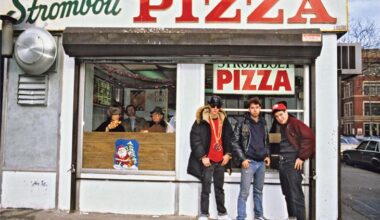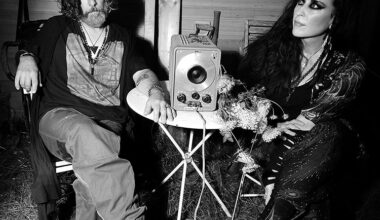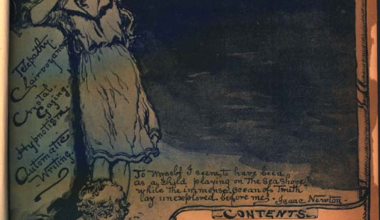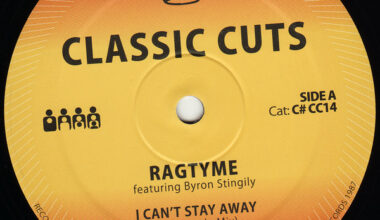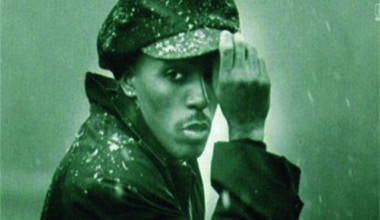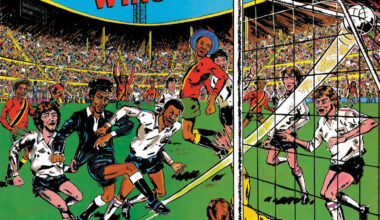Our esteemed columnist digs deep and hauls out some of the more interesting items in his postbag this month…

Regular readers will know Detroit techno is my all-time favourite form of music created using machines this side of Suicide. It only takes one blast of Underground Resistance to reawaken my inner demon and up soar the same old tingles. This month a double DVD package arrived containing two of the best films about Detroit techno I’ve ever seen. Both are by French director Jacqueline Caux and capture the defiant souls who stayed in their beleaguered city, including Juan Atkins, Derrick May, Carl Craig, “Mad” Mike Banks and Jeff Mills, while crucially presenting Detroit itself as the main character that inspired their monumental music.
‘Detroit Techno’ from 2017 starts by slowly panning across the endless streets of burnt-out houses before halting at some graffiti by a vacant lot that declares “NOTHING STOPS DETROIT”, its shocking effect amplified by Electrifying Mojo (the seminal DJ whose 1970s radio show mixed Kraftwerk with P-Funk to start everything) reading from his book ‘The Mental Machine Stop By Here Freedom Come’. Caux lets her film breathe intelligently, encouraging Juan Atkins in his studio to recount his early story in unusually vivid detail. It’s helped by fabulous footage of mid-80s Detroit getting down to ‘Clear’, Juan spinning in 2015 and the fabled mastering machine that pressed his early lacquers.
Derrick May speaks with eloquence about his start as Juan’s protégé, revealing how Transmat took its name from Model 500’s ‘Night Drive’ and how the MS catalogue numbers stood for “Metroplex Subsidiary”. He’s understandably resentful at how UK labels started calling, not to sign him but “to make other peoples’ records sound better… we felt rejected. I think that fuelled an internal fire in us”. After his unearthly music gives Detroit’s ruins their perfect soundtrack, Derrick’s fire caught light in 1989, with the ever-devastating ‘Strings Of Life’. He remembers calls coming to DJ in Europe (“fun and easy money”) before temporarily retiring in disgust at how commerce diluted the music and ignored Detroit. “Detroit is unique. It’s like a creative pool that was left untouched…like the rain forest of electronic music,” he says.
Emphasising the lineage, Carl Craig appears next as Derrick’s globally-successful protégé, before Jeff Mills sits exuding calm control (contrasting with astonishing 1983 film of him cutting and scratching as The Wizard) as he talks about his Axis, Purpose Maker and Tomorrow labels, reads a 12-inch’s sounds by perusing its grooves and explains the crystal embedded in his ‘Emerging Crystal Universe’ package.
‘Cycles Of The Mental Machine’ dates from 2006, when Caux focussed on Detroit itself (including gospel services, blues bars and community rebuilding projects). The Electrifying Mojo calls the city “a place of refuge for visionaries” before remembering George Clinton’s mothership invading his studio and blowing his mind with the funkiest sounds he’d ever heard.
Mad Mike is interviewed in face-concealing darkness, reasoning that “I live in the problem, so I guess I’m part of the solution” before Carl Craig drives over the astonishing border between Detroit’s barren wastelands and white mansions where they burned crosses on the lawns if black families moved in.
UR’s ‘Amazon’ from ‘World 2 World’ kicks up as those tragic ruins reappear like rows of broken teeth; a supremely moving moment in a powerfully-emotional film.
That last sequence brought back a favourite DJing memory of it opening my set at Manchester’s Jockey Slut club on a Friday night when Slam were headlining. Orde and Stuart stood happily in the booth as the crowd of techno-conscious nutters went bananas. This immensely warm vibe carried on for the next few hours then at the home of one of the organisers until the pubs opened next day.
Such joyful cavorting happened nearly every weekend throughout the 1990s as I played UK clubs that often felt like second homes thanks to the lovely individuals who ran them; Glasgow’s Slam, Leeds’ Back To Basics, Liverpool’s Voodoo, London’s Heavenly Social and several more I can’t remember. There were globe-spanning tours with The Orb, Primal Scream and The Prodigy, the Paradiso in Amsterdam, Hardkiss bashes in San Francisco, Manumission in Ibiza, even a major label record deal for my band Secret Knowledge, who sometimes played these places. Until things got dark around the end of the decade (nothing to do with DJing) it was always a pleasure and huge buzz playing my favourite records for highly-receptive cavorters.
I witnessed many scenes of untold madness, but maybe spending some of the previous decade experiencing things nobody would ever believe in the most dangerous spots in New York helped swerve me away from the cocaine abuse that systematically dehumanised too many DJs and promoters, ruining much of the unbridled fun (alcohol was a much bigger danger, but that’s another story).
This is one reason I find a new book ‘The Secret DJ’ so depressing, despite purporting to tell the story of “an international DJ” living “life in the hedonistic fast lane”, capturing “the glamour, the parties, the excess, the highs and the lows” to produce “a shockingly honest exposé of what really goes on beyond the beat.”
It bothers me that the author has to hide their identity and the identities of the leading characters, maybe they’re not well-known enough? Although we sometimes played similar circuits, the author obviously chose bigger money clubs with ambitions beyond getting paid to play records. Sticking with the underground, I still got paid, but always had a great time without regarding bookings as hit-and-run cash machine missions.
Rock ’n’ roll war stories about overdoing drugs got tired years ago and this secret DJ’s antics are somewhat mild compared to what really went down and will remain untold. If it’s dance music tales you want, there are a number of books that prefer to convey the cathartic joy of once-in-a-lifetime moments rather than bemoan the comedown. Check out Tim Lawrence, Bill Brewster, Frank Broughton, while Helen Donlon’s ‘Shadows Across The Moon’ definitively nails the Ibiza the secret DJ complains about.
Which brings us neatly back to Detroit, whose earthly messengers, had much bigger things to worry about than overdoing drugs as they turned their daily pain into beautiful music. And these original secret DJs can still beat anyone hands down when it comes to reducing a crowd to jelly.
